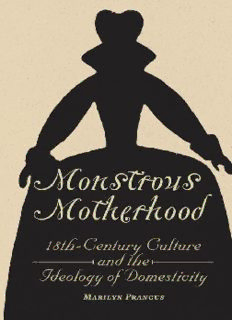
Monstrous Motherhood: Eighteenth-Century Culture and the Ideology of Domesticity PDF
Preview Monstrous Motherhood: Eighteenth-Century Culture and the Ideology of Domesticity
Monstrous Motherhood This page intentionally left blank Monstrous Motherhood Eigh teenth- Century Culture and the Ideology of Domesticity marilyn francus The Johns Hopkins University Press Baltimore © 2012 The Johns Hopkins University Press All rights reserved. Published 2012 Printed in the United States of America on acid- free paper 2 4 6 8 9 7 5 3 1 The Johns Hopkins University Press 2715 North Charles Street Baltimore, Mary land 21218- 4363 www .press .jhu .edu Library of Congress Cataloging- in- Publication Data Francus, Marilyn. Monstrous motherhood : eighteenth- century culture and the ideology of domesticity / Marilyn Francus. p. cm. Includes bibliographical references and index. ISBN 978- 1- 4214- 0737- 1 (hdbk. : acid- free paper) — ISBN 978- 1- 4214- 0798- 2 (electronic) — ISBN 1- 4214- 0737- X (hdbk. : acid- free paper) — ISBN 1- 4214- 0798- 1 (electronic) 1. En glish literature— 18th century— History and criticism. 2. Mothers in literature. 3. Mother and child in literature. 4. Motherhood— Great Britain— History—18th century. 5. England— Intellectual life— 18th century. I. Title. PR448.M66F73 2013 820.9'3520431—dc23 2012012929 A cata log record for this book is available from the British Library. Special discounts are available for bulk purchases of this book. For more information, please contact Special Sales at 410- 516- 6936 or [email protected]. The Johns Hopkins University Press uses environmentally friendly book materials, including recycled text paper that is composed of at least 30 percent post- consumer waste, whenever possible. For Michael and Penina “always witty and quick on the draw” This page intentionally left blank Contents Ac know ledg ments ix Introduction: The Ideology of Domesticity Reexamined 1 1 Mothers of the Apocalypse: Maternal Allegory and Myth in Swift and Pope 25 2 All Too Human: Maternal Monstrosity and Hester Thrale 46 3 Suff er the Little Children? The Infanticidal Mother in Literature 74 4 Until Proven Innocent: Infanticide in the Public Record and in Court 99 5 Be Monstrous or Be Marginal: Stepmothers in Literature 123 6 Pin the Tale on the Stepmother: Elizabeth Allen and the Burneys 149 7 But She’s Not There: The Rise of the Spectral Mother 170 Notes 203 Bibliography 271 Index 285 This page intentionally left blank Ac know ledg ments The gestation period of this book was long, arduous, and punctuated by inter- ruption, change, and the unexpected— all of which seem fi tting for a work on monstrous motherhood. Yet there were many midwives and many sources of support and inspiration during the research, writing, and editing of this book, for which I am most grateful. West Virginia University and the Eberly College of Arts and Sciences funded conference activities that allowed me to test and refi ne my ideas, as well as the sabbatical leaves that gave me the opportunity to shape, and ultimately com- plete, this work. My colleagues in the Department of En glish provided unstint- ing support, insightful answers to my queries, and perspective on scholarship and the profession; I am especially grateful to Dennis Allen, Michael Germana, Rosemary Hathaway, Kirk Hazen, Adam Komisaruk, John Lamb, Ethel Smith, and Lisa Weihman and to my former colleagues Tim Adams, Sophia Blaydes, Pat Conner, John Ernest, Donald Hall, and Robert Markley. My students at West Virginia University continue to challenge and teach me, and working with Lisa Brewer, Mark Kohan, Crystal Lake, Jessika Thomas, and Lori Zerne has been a plea sure. The generosity of the eighteenth- century scholarly community is unparal- leled; a wiser, friendlier group of scholars cannot be found. I am indebted to my colleagues in the fi eld, who gave their time, attention, and wisdom graciously and unreservedly. Katharine Kittredge has been my sounding board and reader since this book was barely a glimmer of an idea; my conversations with Linda Zionkowski were crucial as I worked through the issues of spectral motherhood. Roxann Wheeler read an early prospectus, and her advice led me to rethink and reshape the trajectory of this book; my conversations with Audrey Bilger about gender, per for mance, and audience challenged me to ask and answer questions that otherwise would have been ignored. Laura Engel has spent hours with me over coff ee, sharing her infectious enthusiasm for eighteenth- century studies
Description: